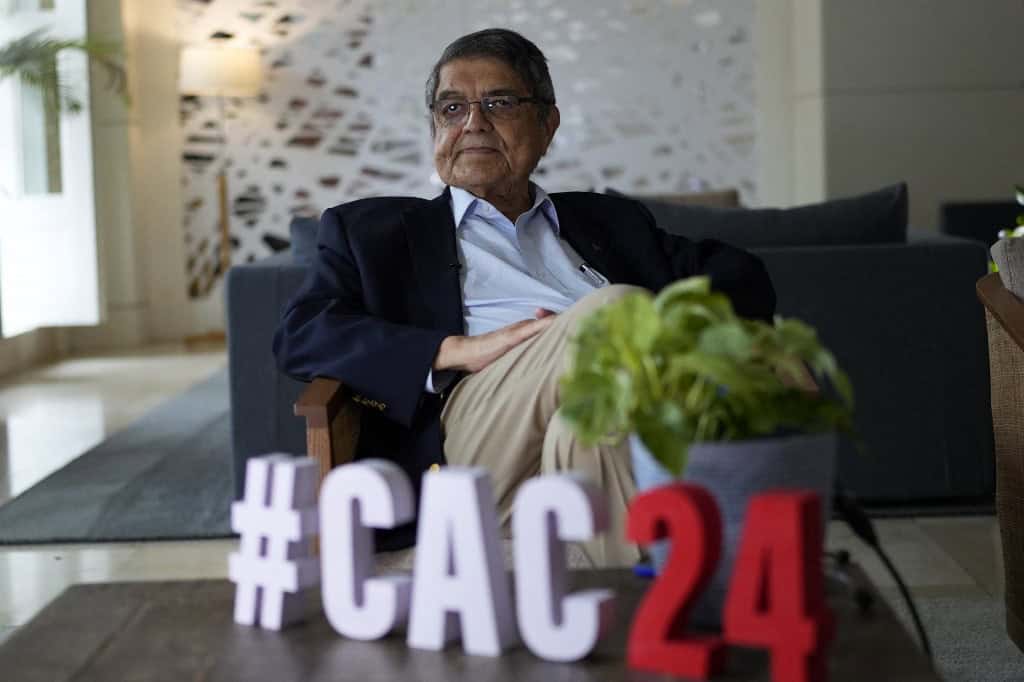The literary festival “Centroamérica cuenta”, which brings together writers from Latin America and Spain in Panama, such as Leonardo Padura (Cuba), Juan Villoro (Mexico) or Sergio Ramírez and Gioconda Belli (Nicaragua), kicked off on Wednesday with a call to defend press freedom.
“I want to pay tribute to the Guatemalan journalist José Rubén Zamora (…) a journalist unjustly imprisoned in his country for exercising his unavoidable role of investigating corruption, one of the worst evils of our political systems and our social life,” said Ramírez, forced into exile in Spain by Daniel Ortega’s government.
“He and so many other Central American journalists like him, persecuted, exiled, their media outlets confiscated because they decided to fully exercise their profession, the profession of the free word, which is a profession with consequences, as is that of a novelist, when one goes to the bottom in the endeavor for the search for truth,” he added.
Zamora, founder of a newspaper critical of the Guatemalan government, was arrested in 2022, despite the fact that an appeals court overturned a six-year prison sentence in 2023 for alleged money laundering. On May 15, a court granted him house arrest, but Zamora remains in jail due to another process against him.
Ramírez, 81, made these statements during a speech at the National Theater in Panama City, at the opening gala of “Centroamérica Cuenta”. A subsequent dialogue between the famous Panamanian salsa singer Rubén Blades and Padura, author of “The Man Who Loved Dogs” (2009), formally kicked off this literary event. “It is not only a festival for writers, but also for thinkers, musicians, filmmakers,” added the festival’s director, Nicaraguan Claudia Neira.
Ramírez founded “Centroamérica Cuenta” in Nicaragua in 2013, but after the 2018 protests against Ortega, supported by the writer, it is held twice a year, once in Madrid and the other in a Central American or Caribbean country.
Authoritarianisms
Ramírez was vice president of Nicaragua from 1985 to 1990, after the triumph of the Sandinista revolution, which overthrew the dictator Anastasio Somoza in 1979.
However, the 2017 Cervantes Prize winner, author of “Divine Punishment”, “Margarita, How Beautiful the Sea” and “Goodbye Boys” was stripped of his nationality and forced into exile after supporting the protests against the government that left more than 300 dead in 2018. In this edition of “Centroamérica Cuenta” there will also be a panel to discuss authoritarianisms.
“It’s a bit what the authoritarian governments in Latin America and Central America pose, we have a plurality of voices that allow us to have different approaches,” says Neira.
Central American literature in the 20th century focused on issues related to military dictatorships and civil wars that ravaged the region, the large banana and mining enclaves, and the situation of poverty that punishes the population.
New literature
“Today the big issues are mass migrations to the United States, drug trafficking, the reign of drugs, drug barons, populist dictatorships, corruption, demagogy,” said Ramírez. “Women, who were practically absent from literature in the 20th century, are now great protagonists (…) this is a completely new phenomenon,” he adds.
Gioconda Belli, like Ramírez forced to go into exile in Spain and stripped of her nationality, will present her book “All Poetry” (1974-2020). “There is a whole new generation of female and male writers who, without a doubt, are telling a series of different and wonderful worlds that will allow Central American literature to have a long life,” says Neira.
The participants will also debate the impact of artificial intelligence on literature. Artificial intelligence “right now in literature is being seen as a very dangerous phenomenon,” although “it is not possible” for it to “improve or attempt to improve what I write,” said Padura.






